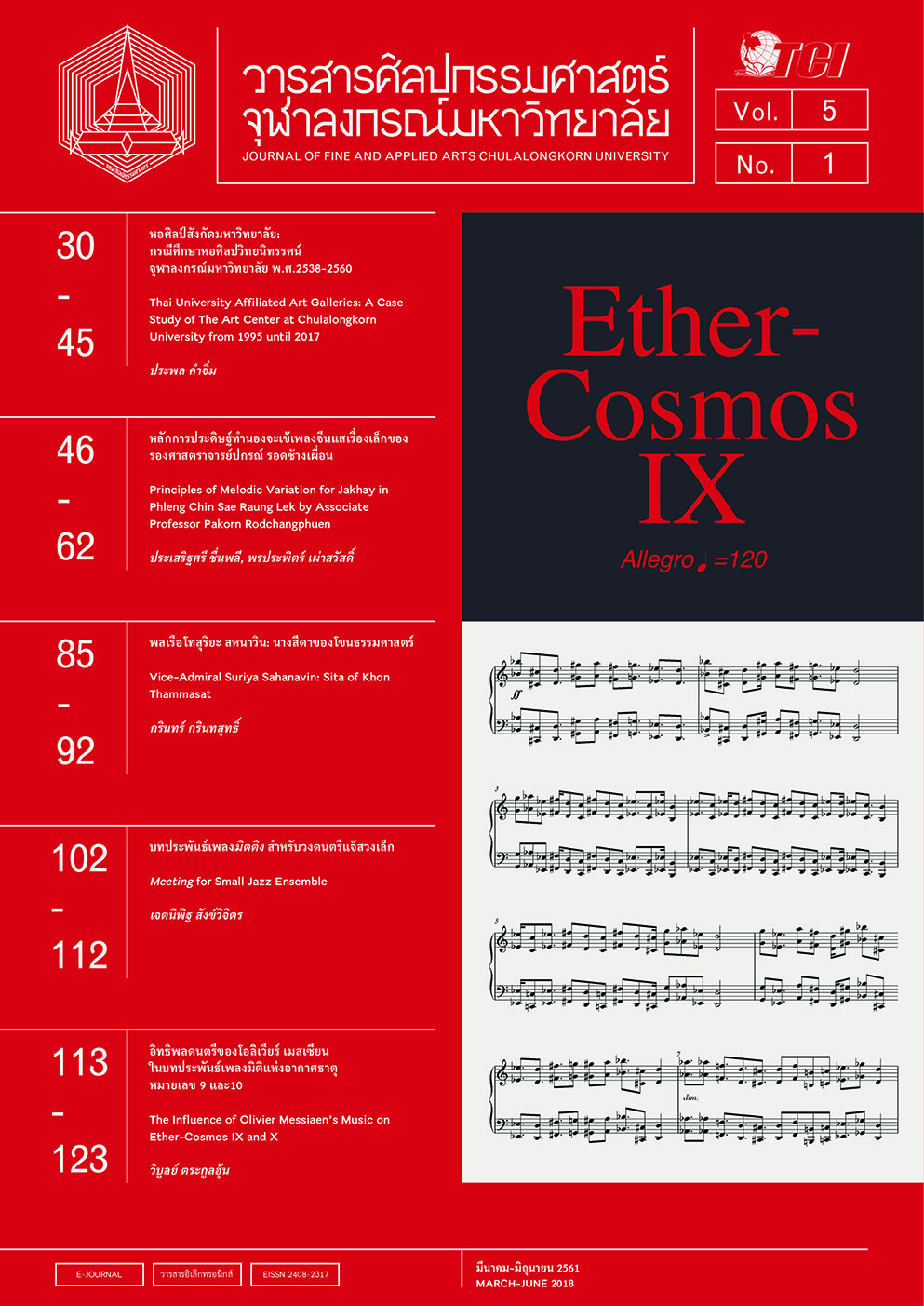หลักการประดิษฐ์ทำนองจะเข้เพลงจีนแสเรื่องเล็กของรองศาสตราจารย์ปกรณ์ รอดช้างเผื่อน
Keywords:
การแปล, การแปร, จะเข้, รองศาสตราจารย์ปกรณ์ รอดช้างเผื่อน, Translation, Variation, Jakhay, Associate Professor Pakorn RodchangphuenAbstract
งานวิจัยเรื่องนี้มุ่งเน้นศึกษาหลักการประดิษฐ์ทำนองจะเข้เพลงจีนแสเรื่องเล็กของรองศาสตราจารย์ปกรณ์ รอดช้างเผื่อน โดยวิธีการรวบรวมข้อมูลเอกสาร การสัมภาษณ์ และการปฏิบัติเพื่อวิเคราะห์หาหลักการประดิษฐ์ทำนองจะเข้ด้วยระเบียบวิธีการวิจัยเชิงคุณภาพ ผลการวิจัยพบว่าหลักการประดิษฐ์ทำนองจะเข้ของรองศาสตราจารย์ปกรณ์ รอดช้างเผื่อนเป็นกระบวนการที่สลับซับซ้อนมีทั้งการแปล (Translation) และต่อยอดไปยังการแปร (Variation) เกิดทำนองที่หลากหลายในเพลงจีนแสเรื่องเล็ก มีหลักและวิธีการที่แตกต่างกันออกไปตามวัตถุประสงค์ของการบรรเลง แสดงความเป็นเอกภาพในศาสตร์แห่งตน อยู่ภายใต้หลักขนบธรรมเนียมและบทบาทหน้าที่ของจะเข้ตามแบบแผนของโบราณจารย์ เพลงจีนแสเรื่องเล็กประกอบไปด้วย 7 บทเพลง คือ 1. เพลงจีนแส 2. เพลงแป๊ะ 3. เพลงอาเฮีย 4. เพลงชมสวนสวรรค์ 5. เพลงมาลีหวน 6. เพลงเร็วแม่วอนลูก และ 7. เพลงลา หลักการประดิษฐ์ทำนองจะเข้เพลงจีนแสเรื่องเล็กของรองศาสตราจารย์ปกรณ์ รอดช้างเผื่อนที่ปรากฏในงานวิจัยเรื่องนี้มี 14 ลักษณะคือ 1. การยึดทำนองหลัก 2. ใช้การเปลี่ยนกระสวนทำนอง 3. การใช้กลวิธีการดีดทิง - นอย 4. ใช้เสียงประสานและความปลั่งจำเพาะของจะเข้ 5. สร้างสำเนียงจีนด้วยการจัดจังหวะช่องไฟ 6. สร้างสำเนียงจีนด้วยการใช้เสียงเรียง 7. สร้างสำเนียงจีนด้วยการใช้ทำนองสลับฟันปลา 8. สร้างสำเนียงจีนด้วยการใช้เสียงชิดและข้ามในกลอนเพลง 9. ใช้การเปิดมือของกระจับปี่ 10. การใช้สัมผัสในและสัมผัสนอก 11. เปลี่ยนช่วงเสียงในการดำเนินทำนองภายใน 4 ห้อง 12. คงทำนองลูกล้อลูกขัด 13. ใช้กลวิธีพิเศษ 8 ลักษณะในการประดิษฐ์ทำนองในเพลงเร็วแม่วอนลูก 14. ใช้กลวิธีพิเศษ 7 ลักษณะในการประดิษฐ์ทำนองในเพลงประเภทปรบไก่สำเนียงจีน
This research aims at studying the principles of melodic variation for ‘Jakhay’ in ‘Phleng Chine Sae Raung Lek’ as performed by Associate Professor Pakorn Rodchangphuen by collecting and analyzing data from documents, interviews, and performances using qualitative research methodology. The results revealed that the principles of melodic variation for Jakhay in Phleng Chine Sae Raung Lek in the composition of Associate Professor Pakorn Rodchangphuen involved a complex procedure including translation and variation resulting in a variety of melodies. The principles and methods varied depending on the objective of the performance. This demonstrated the unity between his knowledge and the traditions and roles of Jakhay according to customs of the masters in preceding generations. Phleng Chine Sae Raung Lek consists of 7 compositions: 1) ‘Phleng Chine Sae,’ 2) ‘Phleng Pae,’ 3) ‘Phleng Ar Hear,’ 4) ‘Phleng Chom Suan Sawan,’ 5) ‘Phleng Malee Huan,’ 6) ‘Phleng Rew Mae Worn Look,’ and 7) ‘Phleng La.’ The principles of melodic variation for Jakhay in Phleng Chine Sae Raung Lek as performed by Associate Professor Pakorn Rodchangphuen that were studied in this research had 14 characteristics as follows: 1) keeping the main melody, 2) changing melodic patterns, 3) using the ‘Ting-noi’ technique (double stopping on the metal strings), 4) using harmonics and specific resonance of Jakhay, 5) cultivating a Chinese tone by arranging rhythm sections, 6) cultivating a Chinese sound by using serial sounds, 7) cultivating a Chinese sound by using a sawtooth melody, 8) cultivating a Chinese sound by using joined and skipped sounds as in a music poem, 9) using the open-hand technique of a four-stringed lute, 10) using internal and external rhymes, 11) changing the range of melody over 4 bars, 12) keeping the ‘Look Lor Look Kad’ melody, 13) using 8 special techniques to achieve melodic variation in ‘Phleng Rew Mae Worn Look,’ and 14) using 8 special techniques to achieve melodic variation in a song in ‘Prok Kai Samneang Chine’ category.
Downloads
Published
Issue
Section
License
ลิขสิทธิ์ของบทความเป็นของเจ้าของบทความ บทความที่ได้รับการตีพิมพ์ถือเป็นทัศนะของผู้เขียน
กองบรรณาธิการไม่จำเป็นต้องเห็นด้วยและไม่รับผิดชอบต่อบทความนั้น






